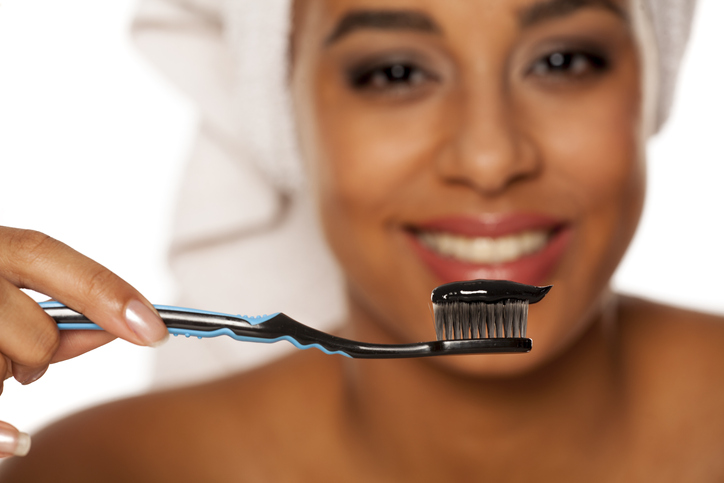
Charcoal toothpaste is a popular option for people looking to whiten their teeth. But does it really work?
Many people swear by charcoal as a natural wellness product. In the past few years, it has gained popularity in the oral health industry and is touted for its ability to whiten teeth and freshen breath. Model Kendall Jenner even promotes charcoal-infused oral care products from a brand called Moon on her Instagram.
There’s no doubt that charcoal is a trendy teeth-whitening option, but how does it really impact your smile and overall oral health? Here’s what you need to know.
Does Charcoal Toothpaste Work?
Activated charcoal is a fine grain powder that is often used in beauty products and toothpaste. It is made from carbon (i.e. wood, coconut shells, and other natural ingredients) that is oxidized under extreme heat. Activated charcoal is incredibly porous, meaning that it’s highly effective at absorbing bacteria, oil, and dirt. It can even be used in medical settings to remove dangerous toxins.
However, it may not actually be effective at whitening your teeth. In fact, most claims about charcoal toothpaste are unproven. While it may help improve bad breath and remove surface stains from your teeth — including those from coffee, red wine, and tobacco — there is no evidence that charcoal has any impact on stains below the tooth’s enamel. Its effects as a whitening product are therefore minimal and short-term at best.
Is Charcoal Toothpaste Safe?
In addition to offering few true benefits, charcoal toothpaste may actually be harmful for your oral health. According to a 2019 study from the British Dental Journal, it offers little protection against tooth decay. It can also get caught in cavity fillings and irritate sensitive gums. If used regularly, charcoal toothpaste — which is more abrasive than regular toothpaste — could potentially wear down your tooth enamel. This may make your teeth appear more yellow by exposing the dentin, which is a calcified yellow tissue below the enamel.
Charcoal toothpaste brands often don’t contain fluoride, an important mineral that helps keep your enamel strong and protects your teeth from decay. That’s why instead of charcoal toothpaste, dentists typically recommend brushing with regular toothpaste that contains fluoride.
“Activated charcoal can be used as a supplement to brushing with regular toothpaste for people who are seeking a whiter smile, but it cannot be used in place of it,” says cosmetic dentist Gregg Lituchy in Harper’s Bazaar. “Regular toothpaste gives us the fluoride we need to fight dental decay so it’s necessary to keep it as part of a daily regimen.”
Other Teeth Whitening Options
Besides charcoal, there are several other safe and effective whitening options available. Popular at-home solutions include whitening toothpastes and whitening strips. While these options don’t work as well as professional products provided by dentists, those with the ADA seal of approval can be effective. Most importantly, regular brushing after eating or drinking anything that could stain your teeth helps keep your smile fresh.
If you’re looking for professional, safe, and highly effective teeth whitening, visit Espire Dental’s Oklahoma City, OK location. We offer in-office laser whitening that can make your smile up to six shades whiter. Or, consider one of our at-home treatments, which can whiten your teeth in just two weeks.
At Espire, our dental care professionals have decades of combined experience and are committed to making your visit as enjoyable as possible. While you’re benefiting from the best treatment options in Oklahoma City, you can watch your favorite shows or listen to music on noise-canceling headphones. It’s our goal to make your visit comfortable and even fun!
Contact us today to set up an appointment.
